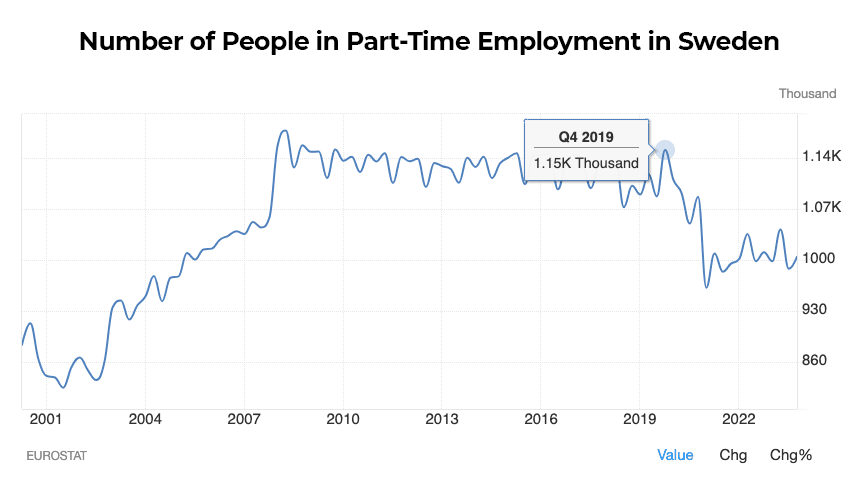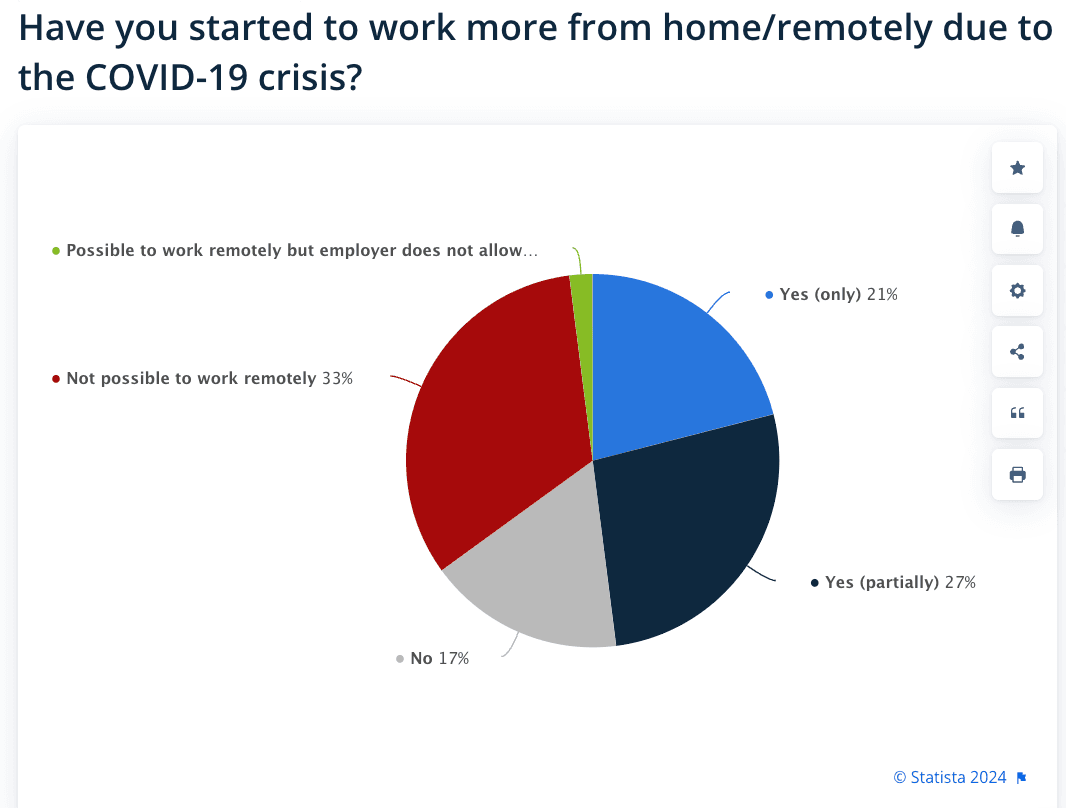Sweden
A number of companies in Sweden are set to pilot a 4 day week in 2024.
4-Day Workweek in Sweden
A number of companies in Sweden are set to a pilot of the four-day workweek, starting June 2024. This initiative is part of a larger European movement, led by 4 Day Week Global.
This experiment will run for 6 months and aims to explore the benefits and practicalities of a shortened workweek, aligning with simultaneous trials across several European nations.
Sweden made headlines in 2015 when it implemented a four-day workweek in Gothenburg. Instead of adhering to the traditional model of four eight-hour workdays, the working hours were reduced to six hours per day, totalling 30 hours per week.
The trial adopted an innovative 100:80:100 approach, which allowed employees to receive their full salaries for working 80% of the time while still achieving 100% productivity.
The public institutions that took part in this experiment were granted financial support by the local government so there were no deductions in the salaries of employees. This experiment went on for almost 2 years, making it the first-ever example of a long-term trial run held for a 4–day workweek.
Pilot Results
As an example, the effects of this initiative were studied in Gothenburg’s hospital orthopedics unit and two local nursing homes. In the hospital’s orthopedics unit, 80 nurses and doctors participated in a 24-month trial where traditional working hours were modified.
Simultaneously, a controlled study compared productivity between two nursing homes operating under different working hours.
1. Hospital Orthopedics Unit:
- Health Outcomes: Remarkably, none of the participants in the orthopedics unit reported sick during the entire 24-month period.
2. Nursing Homes Study:
- Productivity Increase: The nursing home that reduced working hours to 6 hours a day saw staff complete over 80% more patient activities than the staff working traditional 8-hour shifts.
- Financial Challenges: Despite the productivity gains, the initiative faced financial hurdles, incurring an additional cost of $120,000 per month. This led to the premature ending of the trial following a change in government, as the new authorities struggled to justify the ongoing expenses.
These outcomes highlight the potential benefits and challenges of reducing working hours in healthcare settings, demonstrating significant improvements in employee health and productivity, albeit with considerable financial implications.
Companies Implementing the 4-Day Work
Although the 2-year long trial was successful in Sweden, there are a few companies that recently implemented a 4-day workweek.
Let’s dig deeper into more details about them:
1. Seably
Founded by The Swedish Shipowners' Association in September 2020, Seably offers a unique marketplace for maritime training, emphasizing high-quality courses and promoting a vibrant online community.
From September to November 2022, the company embarked on a 4-day workweek trial as part of its commitment to innovation in its organizational culture. It followed the 100:80:100 principle, where most employees enjoyed Fridays off.
However, an exception was made for customer support teams who adapted their schedules to ensure 24/7 support.
The obtained results were positive, which forced the company to continue with the implementation of a 4-day workweek. These include:
- Increased Employee Satisfaction: This initiative led to heightened employee satisfaction, with staff reporting a significant reduction in burnout.
- Higher Productivity per Hour: Despite working fewer hours, workers were more focused and efficient towards their jobs, contributing to higher productivity levels overall.
- Enhanced Work-Life Balance: Employees enjoyed an improved balance between their professional and personal lives, leading to better well-being and mental health.
All these successful results are also attributed to the internal workshops conducted by Seably across various business units with an effort for this innovative approach to work.
2. Sandqvist Bags
Sandqvist Bags is a renowned Swedish company known for manufacturing high-quality bags, backpacks, and accessories. The brand introduced a four-day workweek on 27 February 2023 to build a healthy work-life balance among its workers.
This bold step aimed to uphold the company's productivity and service standards while granting employees more leisure time. Notably, this transition was made with the assurance that salaries would remain unchanged despite the reduced working hours.
The adoption of a 4-day workweek by Sandqvist Bags is projected to bring about a series of transformative benefits for both the company and its employees. These include:
- Enhanced Employee Well-Being: By offering employees more free time for personal development, family, and leisure activities, Sandqvist noticed an improvement in overall employee satisfaction and well-being.
- Sustainable Performance: Aligning with the CEO's vision, the initiative tends to lead to better performance as employees feel more rested, valued, and engaged.
- Attractiveness as an Employer: The move to a 4-day workweek has made the company more attractive to current and potential employees, enhancing the company's ability to recruit and retain top talent.
3. Toyota
Toyota, a renowned global automotive manufacturer originally from Japan, has been at the forefront of innovative business practices for decades.
The company’s Swedish operations introduced the four-day workweek as a voluntary option for employees, allowing them to work longer hours across four days instead of the traditional five.
This policy was aimed at boosting employee satisfaction and retention by offering more flexibility and a better balance between work and personal life.
- Higher Productivity: The mechanics on a 30-hour-per-week schedule demonstrated higher productivity levels compared to those working the traditional 40 hours. Thus, the total output from them exceeded that of their counterparts on a standard workweek.
- Lower absenteeism: With more time to rest and manage personal affairs, employees took fewer sick days, improving overall attendance. Moreover, it also led to higher morale and job satisfaction among employees, which contributed to lower turnover rates.
- Happier Customers: Customer satisfaction increased, likely due to the more efficient service and possibly the positive attitudes of the more satisfied workforce.
Would you like a 4 day work week?
Vacation Policy in Sweden
Sweden has a well-structured vacation policy governed by the Annual Leave Act, which ensures employees are entitled to paid vacations for 25 days. Out of this, they must use at least 20 days each year.
Any unused mandatory leave, along with any additional leave provided under the terms of the employment contract, can be carried over to the following year.
Moreover, employees are also entitled to a holiday allowance, amounting to 12% of their annual gross salary. This bonus can be paid in various ways. It can be distributed monthly by dividing it into twelve parts, paid out quarterly, or paid once a year in a lump sum.
Overtime in Sweden
In Sweden, the standard working week is set at 40 hours, with any additional hours classified as overtime. Employers are required to compensate for overtime either financially or through compensatory leave, depending on what suits the operational needs of the organization.
The calculation for overtime pay is differentiated by the timing of the overtime hours worked. For regular overtime hours, the pay is calculated by dividing the monthly salary by 94. This is considered simple overtime and applies to overtime work done outside the designated hours for qualified overtime.
Qualified overtime includes hours worked during specific times which attract a higher rate of compensation.
Qualified overtime = Monthly salary divided by 72
Part-Time Working in Sweden
Part-time employment in Sweden has seen fluctuations over the years.

Source: Trading Economics
The fourth quarter of 2023 witnessed an increase to 1004 thousand from 987.60 thousand in the third quarter of the same year, according to EUROSTAT data. On average, part-time employment in Sweden has been recorded at 1051.31 thousand from 1998 until 2023.
The country’s part-time work involves commitments of fewer than 35 hours per week, compensating employees based on the percentage of a full-time position their hours represent.
Alternatively, they may choose hourly employment arrangements, where compensation is tied to the number of hours worked.
Remote Working in Sweden
Remote working in Sweden has seen significant growth and adaptation, particularly influenced by the COVID-19 pandemic.

According to a 2024 survey, around 48% of people in Sweden were able to work fully or partially remotely.